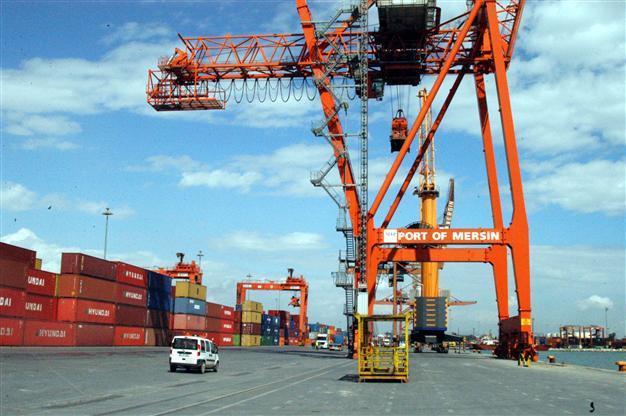Turkey’s 2.9 pct growth in 2014 fails to meet target
ANKARA – Agence France-Presse

DHA Photo
The Turkish economy grew 2.9 percent, above expectations, in 2014 but the figure fell short of meeting the trimmed official goal, putting more growth target pressure on the shoulders of the government on the eve of the June 7 parliamentary elections.The slowdown from 4.2 percent in 2013 exceeded the 2.7 percent forecasted by economists, but missed the government’s target of 3.3 percent, which was revised downward from 4 percent, according to data provided by the Turkish Statistical Institute (TÜİK) on March 31.
The economy grew by 2.6 percent year-on-year in the fourth quarter of 2014, according to TÜİK, compared to 1.7 percent in the third quarter, 2.2 percent in the second quarter and 4.8 percent in the first quarter.
Output was hampered by global market volatility, geopolitical developments and bad weather, Deputy Prime Minister Ali Babacan said.
“Global financial markets churned in 2014 because of uncertainties in monetary policies implemented by advanced economies; the negative effects of geopolitical crises increased and unfavorable weather conditions limited growth,” Babacan said.
“Last year, the EU expanded 1.3 percent, the Eurozone 0.9 percent and Latin America saw 1.3 percent growth. But in 2014, Turkey managed to preserve its growth performance at 2.9 percent,” he added.
Babacan noted employment saw a significant boost, with a 5.4 percent increase in 2014, but at the same time the unemployment rate also increased last year due to a rising workforce participation rate as Turkey’s young population increasingly approached working age.
“Structural reforms, which will be actualized with the implementation of the 25 Primary Transformation Programs announced recently in detail, will boost our growth potential and minimize the economy’s fragility,” he said.
Finance Minister Mehmet Şimşek also said Turkey’s $800 billion economy would nonetheless improve after the polls.
“Delayed investment and consumption due to financial volatility slowed down growth somewhat in the first quarter of 2015,” he said in a statement. “But we expect that growth will accelerate in the second half of the year with the increase in both political and financial predictability.”
Şimşek wrote on Twitter the economy was performing well in a difficult external environment.
“Turkey is growing despite the weak trend in the global economy, the slowdown in our biggest trade partner the EU and geopolitical tensions,” he said.
The government is eyeing a growth spurt ahead of the June 7 legislative elections, with President Recep Tayyip Erdoğan pressuring the Central Bank for aggressive rate cuts.
The economic performance of Turkey - which has lagged recently after posting stellar growth rates in the first half-decade of Erdoğan’s leadership - is under the spotlight this year as it holds the presidency of the G-20, the AFP reported.
“The Central Bank was already under attack from the government when Turkey was growing at a faster clip,” said Nicholas Spiro of Spiro Sovereign Strategy, a consultancy company, Reuters reported March 31. “The combination of weak growth, a parliamentary election and fragility sentiments puts the Central Bank in a very difficult spot to say the least,” he said.
Although 2014’s output beat expectations, economists say first-quarter growth is expected to be lackluster.
“The hard data of the latest months - everything is quite negative,” said Tatha Gose, a senior emerging market economist at Commerzbank.
The latest data may lead Erdoğan to renew calls for a rate cut, but the weakening currency could give the Central Bank some breathing room, analysts said. The Turkish Lira is down around 12 percent this year, the sixth-worst performance among 25 emerging market currencies, according to Thomson Reuters’ data.
“At the moment, they are keeping policy as tight as possible,” said Erkin Işik, a strategist at TEB-BNP Paribas. “I think they will stick to this policy as long as depreciation pressure continues.”
“The 2.9 percent growth mainly depends on an increase in net exports and the support of public spending,” said Enver Erkan, an analyst at LB Forex. “The net increase in exports is positive of course, but it is impossible to welcome a 2.9 percent increase in growth despite a 4.6 percent increase in public spending,” he said.
















